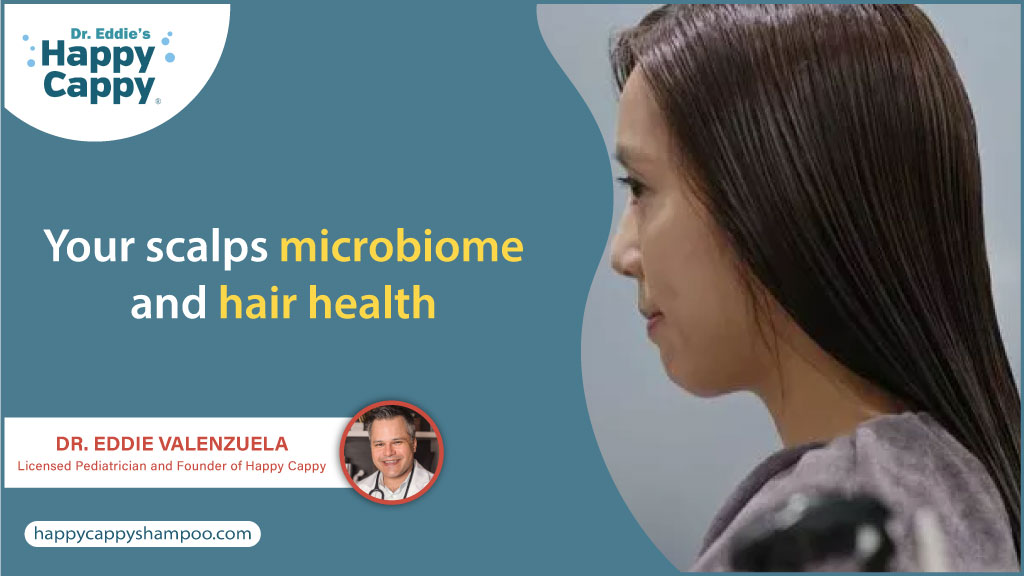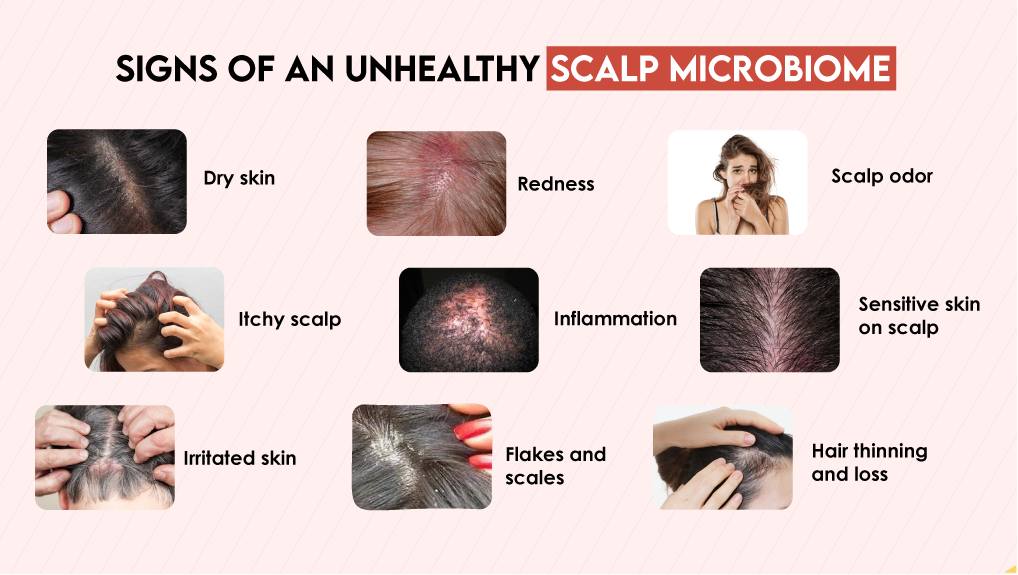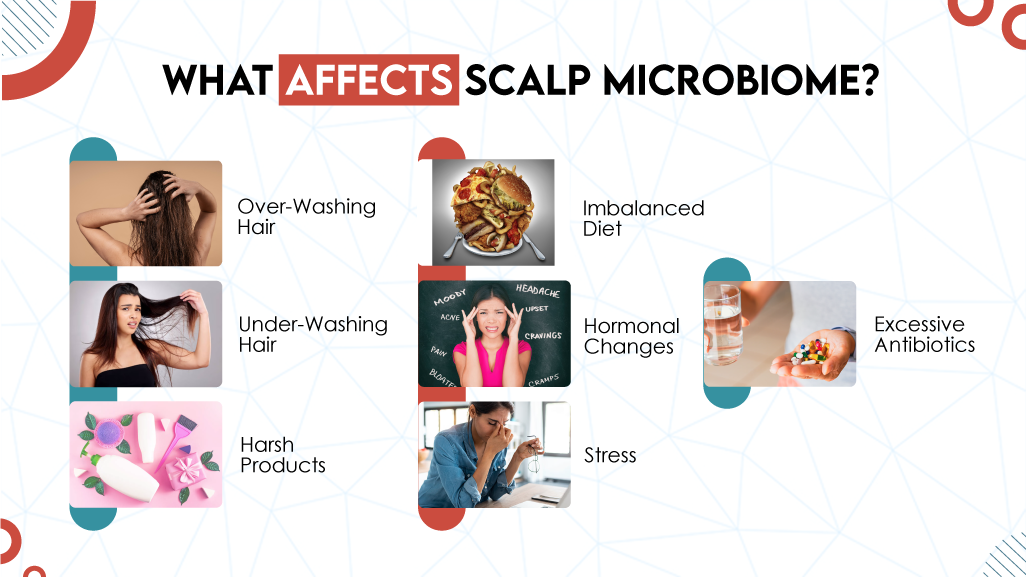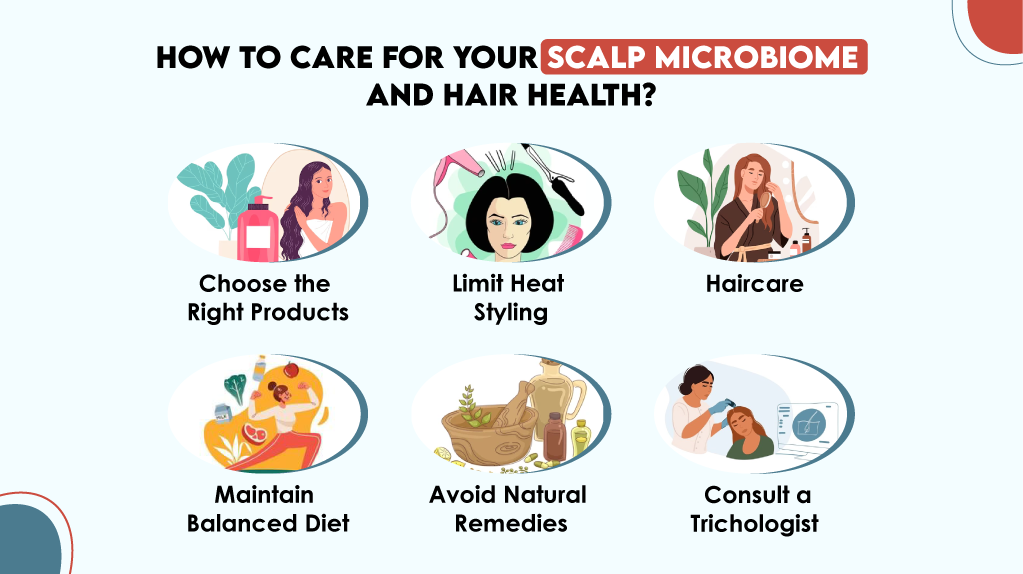
The human body is covered in microorganisms, 100 trillion of them to be exact. While the idea of archaea, bacteria, eukaryotes, and viruses living on your skin and in your organs may be unsettling at first, remember that these tiny colonizers called your microbiome, are actually a vital part of your health. You have microbiomes all over your body, including on your scalp.
What Are Microbiomes?
Microbiomes are made up of many different kinds of microorganisms, each with a very specific purpose that helps balance the habitat to keep both the microorganisms and you happy and healthy.
If one kind of microorganism overpowers the rest, the balance of the microbiome is thrown off. These imbalances can damage the health of whatever is supported by the mini habitat.
If the microbiome on your scalp is damaged or imbalanced, it can wreak havoc on your scalp and hair, causing all kinds of issues, from greasy hair and dandruff to seborrheic dermatitis and hair loss.
Composition of Scalp Microbiome
Our scalp contains various species of microorganisms. Some of the most prominent species are:
- Cutibacterium acnes
- Staphylococcus epidermidis
- Malassezia restricta
- Malassezia globosa
- Propionibacterium
Malassezia, the yeast that causes the iconic dandruff and seborrheic dermatitis is found in abundance on the scalp. This is because our scalp contains a higher concentration of sebaceous glands, especially around the hair follicles that attract the Malassezia globosa.
These microorganisms are a normal part of a healthy scalp. However, sometimes, they can overgrow and cause negative effects on the scalp. Often leading to scalp issues like scalp eczema and hair loss.
Signs of an Unhealthy Scalp Microbiome

Identifying the signs of an unhealthy scalp microbiome can help you diagnose your scalp issues before they get worse and provide treatment to your scalp in time. Some common symptoms that you will notice are:
- Dry skin
- Itchy scalp
- Irritated skin
- Redness
- Inflammation
- Flakes and scales
- Scalp odor
- Sensitive skin on scalp
- Hair thinning and loss
You may also notice that your hair will either become excessively dry or oily. It will look and feel dull and dead. Your scalp microbiome can have a great effect on your hair health. So if you want soft, smooth, luscious locks then keeping the scalp microbiome healthy is essential.
What Affects Scalp Microbiome?

Your scalp’s health is important. Unfortunately, lots of things can damage a scalp microbiome, including over-washing your hair, under-washing your hair, harsh products, and overuse of antibiotics.
Over-Washing Hair
The main reason your scalp’s microbiome can become imbalanced is over-washing. If you wash your hair too much, you can strip away some of the microorganisms and inhibit the growth of others, leaving your microbiome insufficient and imbalanced. Avoid washing your hair more than once a day.
Under-Washing Hair
Unfortunately, you can go too far in spreading out your washes. Not sufficiently removing the building-up oil and environmental dirt and grime can cause inflammation and clog hair follicles, which will disrupt your scalp microbiome.
Wash your hair every other day with a nickel-sized squirt of gentle daily shampoo. Gently massage the shampoo into your scalp and thoroughly rinse it out.
Harsh Products
Lots of shampoos, conditioners, hair sprays, gels, and other hair products are made with some nasty ingredients that can do some serious damage to your scalp microbiome. Sulfates, for example, are hard-hitting detergents that can weaken hair follicles, cause scalp sensitivity and inflammation, and strip away natural oils. Avoid products with ingredients like Sodium Lauryl Sulfate, Sodium Laureth Sulfate, and petroleum-based Phthalates.
Excessive Antibiotics
Antibiotics are designed to kill dangerous bacteria, but sometimes, when they’re over-used, they kill off the helpful bacteria that eat the Malassezia, allowing the fungus to multiply, which in turn throws off the microbiome balance and causes the oil glands to work overtime and the scalp skin cells to overgrow.
Too much oil leads to the red, crusty, and oily rash associated with seborrheic dermatitis, and the excess skin cells clump together and flake off as dandruff.
Imbalanced Diet
What you eat affects your overall health, scalp, and hair. Eating an unhealthy, imbalanced diet can disrupt your scalp’s health. Consuming processed and high-fat foods can cause a deficiency of essential nutrients in the body, making you prone to developing different scalp issues.
Hormonal Changes
Hormonal changes in the body can trigger your scalp’s sebaceous glands to produce excessive sebum and disrupt its pH level, which results in the overproduction of microorganisms and bacteria on the scalp, especially Malassezia yeast, leading to inflammation and irritation on the scalp.
Stress
When you are under stress for a longer period, it can negatively impact your scalp, hair health, organs, and overall health. Stress can also weaken you body’s immune system, making you prone to developing different scalp issues.
Benefits of a Balanced Scalp Microbiome
If you are wondering why you should be so concerned about maintaining a balanced scalp microbiome. Here is your answer:
Availability of Nutrients
The scalp microbiome helps break down sebum and release essential nutrients to the scalp and hair. These nutrients help keep your scalp healthy, strengthen hair, and promote hair growth. A balanced microbiome means balanced sebum production, preventing your scalp from becoming too oily or dry.
Protect Scalp Against Pathogens
Pathogens are harmful bacteria that can cause infection on the scalp. But by maintaining a balanced microbiome, you will strengthen your scalp’s natural protective barrier. The beneficial or good bacteria on the scalp will easily fight off these pathogens and protect your scalp.
Maintain pH Balance
Maintaining a balanced pH level is important not only for the skin but also for the scalp. Disruption in the pH level can lead to dry scalp, dandruff, and hair damage. But by keeping your scalp microbiome balanced, you can maintain a suitable pH level on the scalp.
Improve Hair Health and Appearance
If anything happens to your scalp, it will also affect your hair. Whether it’s dryness, itching, or inflammation, these issues can make your hair look rough, dry, and lifeless. But if you maintain a balanced microbiome, it will promote a healthier hair growth cycle and improve the overall appearance of your hair.
How to Care for Your Scalp Microbiome and Hair Health

We know it may sound complex, and you may think it’s very difficult to take care of your scalp and maintain a healthy scalp microbiome, but the truth is it’s very easy. Just by following a few simple steps, you can have a healthy scalp and hair.
Choose the Right Products
Whether it’s your skin or your scalp, it’s important that you choose the right products. Shampoo and other hair products that contain harsh chemicals like fragrance, paraben, and sulfate can disrupt the balance of your scalp microbiome.
This is why it is essential that you choose the right shampoo for your scalp. The best option is to use a gentle shampoo that is free from skin irritating chemicals and contains natural ingredients like licorice root extract that help clean your scalp without affecting its health.
If you are experiencing skin conditions like seborrheic dermatitis, dandruff, or cradle cap, then you can use a medicated shampoo for cradle cap or an anti-dandruff shampoo that contains pyrithione zinc as an active ingredient to control the production of Malassezia yeast on the scalp.
Limit Heat Styling
Using styling products that emit excessive heat can cause your scalp to dry out. It will also disrupt the microbiome and make your hair look thin and rough. So, it’s better if you choose heat-free styling tools or ones that produce low heat to maintain your scalp’s natural moisture and have healthy hair.
Haircare
Some small mistakes can cause outsized damage to our hair health and scalp. So you must take extra good care of your scalp. You can do this by
- Keeping your scalp clean and prevent oil buildup.
- Wash your scalp and hair with lukewarm or cool water.
- Massage your scalp regularly.
- Brush your hair gently.
- Keep your body hydrated.
- Avoid using hair products that contain harsh chemicals.
- Protect your scalp from the sun.
- Do not underwash or overwash your scalp.
Maintain Balanced Diet
A balanced diet that is rich in minerals, beneficial fatty acids, and vitamins, especially vitamins A, B, C, and E, can help you maintain your scalp microbiome. Also, adding probiotics and prebiotics in your diet will help maintain your gut health, which has a great impact on your hair and scalp health.
Avoid Natural Remedies
Natural remedies may sound like a good idea to keep your scalp healthy and nourished, but did you know they can do more harm than good? Many have heard that coconut oil helps moisturize your skin and get rid of flakes.
However, you might not know that coconut oil, if left on the scalp, can trigger the overproduction of Malassezia yeast and cause dandruff and seborrheic dermatitis, and if you are already experiencing these conditions, it will make them even worse.
So before you put anything on your scalp, consult a doctor to be on the safe side.
Consult a Trichologist
If you are unsure about anything or facing any issues with your scalp, you may consult a trichologist. They are doctors who are experts in scalp health and issues. They will thoroughly examine your scalp and diagnose if you are experiencing any scalp issues, microbiome imbalance, or what you can do to make your scalp health better.
Conclusion
The scalp microbiome is made up of various microorganisms that live on our scalp. Usually, they are harmless and are essential for having a healthy scalp. However, sometimes, one type of species can overpower others and cause issues like itching, irritation, and inflammation.
Maintaining a balanced scalp microbiome is crucial for healthy hair. You can maintain its balance by taking extra good care of your scalp.
Shop Happy Cappy Products–these are dermatologist-tested, fragrance-free, paraben-free, and sulfate-free. Our Medicated Shampoo will gently clean your scalp and skin, and reduce symptoms like flaking, scaling, itching, and irritation associated with seborrheic dermatitis, dandruff, and cradle cap.
While our specially formulated Eczema Shampoo and Moisturizing Cream for Eczema can help you soothe that itchy, dry, sensitive eczema-prone skin.
FAQs
Does microbiome affect hair growth?
Yes, your scalp and body’s microbiome can highly impact your hair growth. If you have a balanced microbiome it will help break down sebum into the essential nutrients and provide them to your scalp and skin to promote healthy hair growth.
What does the scalp microbiome do?
The two most prominent and essential things that the microbiome does for us is protect our scalp against pathogens and help maintain healthy skin and hair growth.
What causes poor scalp health?
There are various factors that can disrupt the balance of the scalp microbiome and result in poor scalp health and hair growth. Some of these factors are:
Overwashing the scalp
Under-washing
Using harsh hair products
Consuming excessive antibiotics
Hormonal changes in the body
Stress
Unhealthy diet
How to reset scalp microbiome?
You can support your scalp microbiome health by consuming probiotic rich foods, avoiding harsh hair products, limiting the use of heat styling products, and avoid putting any natural remedies on the scalp without a doctor’s consent.
